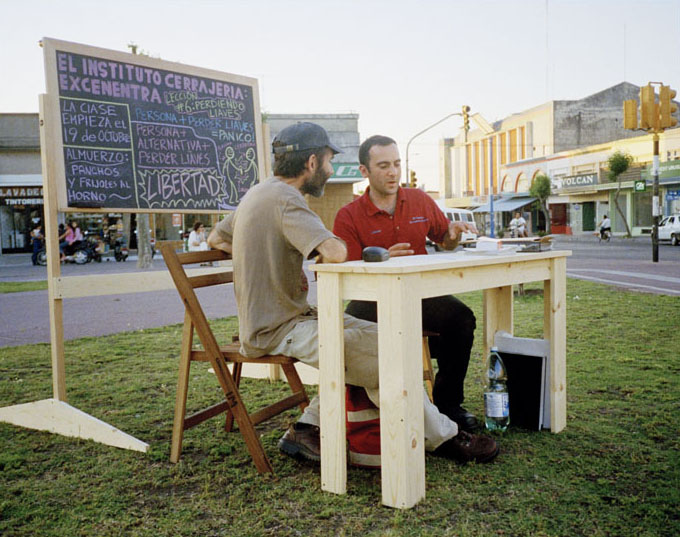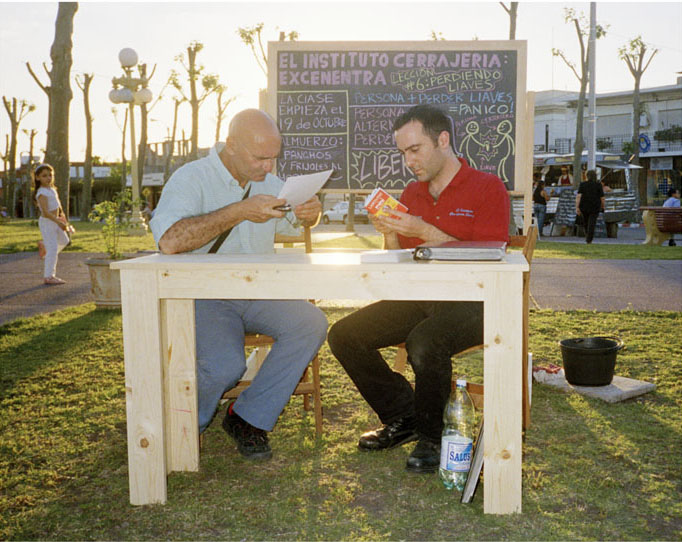The Locksmithing Institute of Excentra: Part 1, Frey Bentos, Uruguay, October, 2006
Students in Frey Bentos, Uruguay were given the chance to lose their keys of their own free will. The keys were then brought to San Francisco and the instructor lost them on behalf of the students of Uruguay. When someone loses their keys accidentally they panic. When keys are lost by choice they might find liberation. Full lesson plan below:
The Locksmithing Institute of Excentra
Lesson Plan #6: Losing Keys
In Lesson #6 the students of The Locksmithing Institute of Excentra will be instructed in practical techniques to lose their keys. The faculty and staff of The Locksmithing Institute have found it necessary to broaden our definition of keys to encompass these modern times. All of the people, places and things in our life are keys; each allows us to enter or exit certain cognitive spaces. When viewed this way the world becomes one immense, possessed entity that acts as a trigger to alter our consciousness. Its haunted condition allows us to bounce between many different times, places and emotions without even realizing it.
The faculty and staff have found that the word “haunted” itself doesn’t mean anything. It is instead a sensation that arises due to the perpetual state of occupation that exists everywhere. Our physical keys mirror this paradigm. As they rattle in our pocket our state of occupation becomes amplified. They are not all they seem to be. Keys are supposed to unlock our feelings of safety and security, but, on the contrary, they are our shackle to certain things, ideas or people. We are supposed to be a free people, but we are not. In our present haunted/occupied condition we are our own jailer and we have been fooled into thinking that our keys (be they physical or mental) are the proof of our supposed freedom. There is no need for a prison for the majority of the people any longer because the contents of our pockets maintain our detention.
Often when a person loses their keys they work themselves into a panicked state. This sense of crisis occurs when the lost key happens to unlock someplace that is associated with the person’s sense of security such as their home or car. Further, this panicked state implies that ones sense of safety and security exists outside of themselves. It would seem that when keys are lost it forces a person to face themselves as they are. Our perception of the world is very delicate. The keys maintain the balance for us. The irony is when the keys are safely on their ring they make it possible for us to be lost to ourselves. When they are lost (in spite of the panic that one may feel) it allows us to confront ourselves and forces us to provide our own feelings of safety and security for ourselves.
In light of this the faculty and staff of The Locksmithing Institute feel that it is not enough to teach someone how to pick a lock, make a new key, find their lost keys, or transform their keys into a new form as students were instructed to in the first five lessons. If one really wants to move about their physical and mental world with complete freedom they must lose their keys of their own free will. More often than not the loss of ones keys is accidental. It is something arbitrary that happens to us that makes us feel powerless.
In Lesson #6 students will be given the opportunity to lose their own keys thus making them a present and active participant in their life as opposed to its passive observer. The hope is that by choosing to do this a persons feelings of panic will be replaced by feelings of liberation. Once the student separates themselves from their key they can potentially become their own vehicle for change and thus be free to experience the world in a new way without the keys acting as their filter.
Tuition is of course free and there will be a hot lunch provided, however please bring your own beverage as we are out of milk

